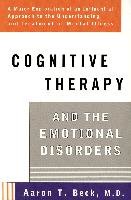Is the emotionally disturbed person a victim of forces beyond his awareness, over which he has no control? This is the belief on which neuropsychiatry, psychoanalysis, and behavior therapy are all based. But what if this premise is wrong? What if a person's psychological difficulties stem from his own erroneous assumptions and faulty concepts of himself and the world? Such a person can be helped to recognize and correct distortions in thinking that cause his emotional disturbance.
Now one of the founders of cognitive therapy has written a clear, comprehensive guide to its theory and practice, highlighting such important concepts as:
· Learning the meaning of hidden messages
· Listening to your automatic thoughts
· The role of sadness, anger, and anxiety
· Understanding and overcoming phobias and depression
· Applying the cognitive system of therapy to specific problems
"A book by a significant contributor to our knowledge… immensely readable, logical, and coherent… This is Beck at his best."-Psychiatry


